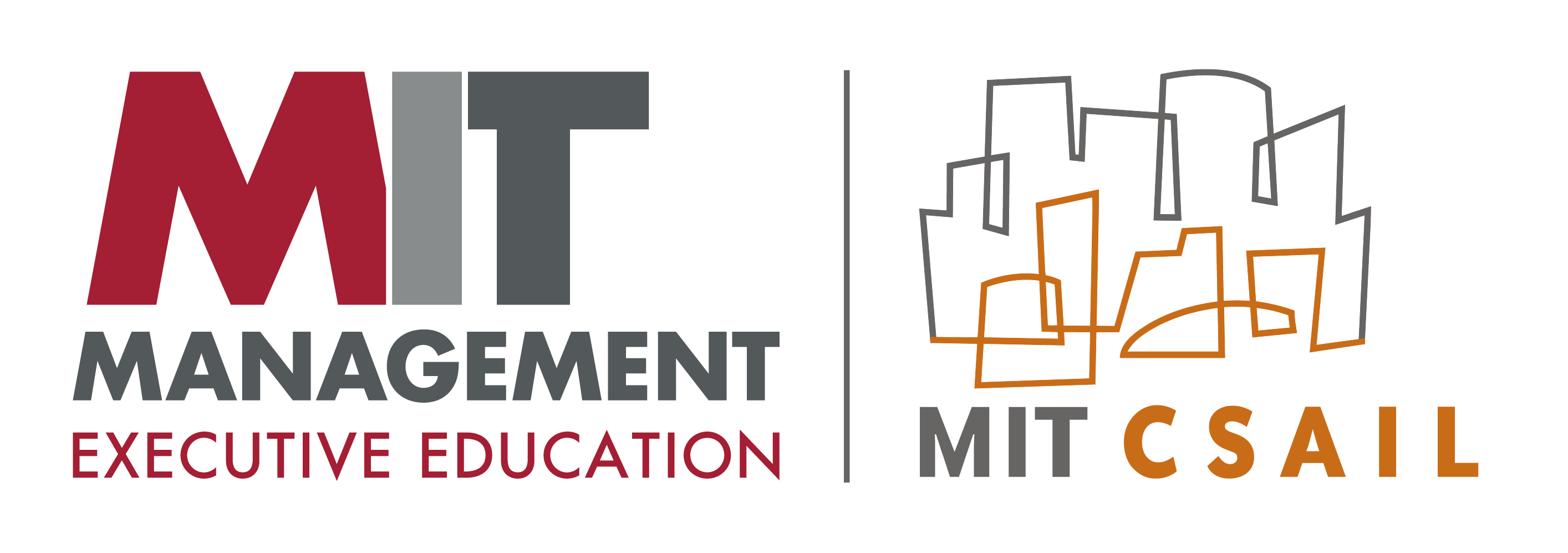

Generative AI platforms have reshaped the way we do business. Deepen your knowledge of new tools and technologies, and learn how AI can be integrated into your organization to drive growth.
Now updated with the latest, most relevant insights on generative AI from leading MIT experts. Join 30,000+ leaders who have already updated their expertise with Artificial Intelligence: Implications for Business Strategy.

6 weeks, excluding
orientation

6-8 hours per week,
entirely online

Weekly modules,
flexible learning
Multiple payment options
1
A practical grounding in artificial intelligence (AI) and its business applications, equipping you with the knowledge and confidence you need to transform your organization into an innovative, efficient, and sustainable company of the future.
2
The ability to lead informed, strategic decision-making and augment business performance by integrating key AI management and leadership insights into the way your organization operates.
3
A sophisticated understanding of what generative AI is and how it works — including its applications and limitations across various industries — and insights into how to adapt to and work with generative AI to keep ahead of the curve.
4
A powerful dual-perspective from two MIT schools — the MIT Sloan School of Management and the MIT Computer Science and Artificial Intelligence Laboratory — offering you a sound conceptual understanding of AI technologies through a business lens.
Artificial intelligence (AI) is no longer just a futuristic sci-fi trope — it’s here now, and it’s here to stay. Innovative technologies are revolutionizing business as we know it, and effective leaders are rising to the challenge of transformation.
But to truly harness the transformative potential of AI and develop relevant skills, you need to know how and when to use it. Deepen your knowledge of AI and its business applications with this online short course.
Over the duration of this online program, you’ll work through the following modules:
Module 1: An Introduction to Artificial Intelligence
Deduce how to gain strategic advantage through the use of different kinds of intelligence.
Module 2: Machine Learning in Business
Evaluate the appropriateness of a business application for machine learning.
Module 3: Generative AI in Business
Explore generative AI and how it can be applied in a business context to gain strategic advantage.
Module 4: Robotics in Business
Evaluate the appropriateness of a business application for robotics.
Module 5: Artificial Intelligence in Business and Society
Assess the impact of AI on the future of work and society.
Module 6: The Future of Artificial Intelligence
Develop a road map for an organization to gain strategic advantage through the use of artificial intelligence.
The course culminates in a capstone project where you’ll develop an AI roadmap for your organization, enabling the deployment of AI initiatives and positioning your business for competitive advantage.
Please note that module titles and their contents are subject to change during program development.
Thomas Malone
Patrick J. McGovern (1959) Professor of Management, MIT Sloan School of Management; Founding Director, MIT Center for Collective Intelligence
Malone is a professor of information technology and organizational studies at the MIT Sloan School of Management. His research focuses on how new organizations can be designed to take advantage of the possibilities provided by information technology.
He has published his groundbreaking research in the book The Future of Work, and over 100 articles, research papers, and book chapters. His newest book, Superminds, appeared in May 2018. He holds 11 patents, has co-founded three software companies, and is quoted in numerous publications such as Fortune, the New York Times, and Wired.
Malone holds a BA from Rice University, two master’s degrees, a PhD from Stanford University, and degrees in applied mathematics, engineering-economic systems, and psychology.
Daniela Rus
Director, MIT Computer Science and Artificial Intelligence Laboratory (CSAIL)
Rus is the Andrew (1956) and Erna Viterbi Professor of Electrical Engineering and Computer Science and director of the Computer Science and Artificial Intelligence Laboratory (CSAIL) at MIT. She serves as the director of the Toyota-CSAIL Joint Research Center and is a member of the science advisory board of the Toyota Research Institute.
Rus’ research interests are in robotics, mobile computing, and data science. Rus is a Class of 2002 MacArthur Fellow, a fellow of ACM, AAAI and IEEE, and a member of the National Academy of Engineering and the American Academy of Arts and Sciences. She is the recipient of the 2017 Engelberger Robotics Award from the Robotics Industries Association. She earned her PhD in computer science from Cornell University.
View exclusive highlights from the course in this trailer:
“At MIT Sloan Executive Education, we are focused on bridging the energy, engagement, and idea flow of physical in-person teaching and learning into online experiences. We aim to positively modify individual and collective behaviors that participants will take back to their teams and propagate throughout their organizations.”
This MIT online short course is delivered in collaboration with online education provider GetSmarter. Join a growing community of global professionals who have already had the opportunity to:

Gain verifiable and relevant competencies and earn invaluable recognition from an international selection of universities, entirely online and in your own time
Enjoy a personalized, people-mediated online learning experience created to make you feel supported at every step

Experience a flexible but structured approach to online education as you plan your learning around your life to meet weekly milestones